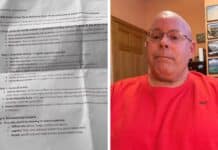
After a seven-month saga that left many secondary schools across Minnesota without the presence of a school resource officer, the legislature has sent its bipartisan “SRO fix” bill to the desk of Gov. Tim Walz.
Just a few hours after the Minnesota Senate voted 61-3 for final passage of HF3489 on Thursday, Walz posted on social media that “as soon a it reaches my desk, I’ll sign it into law.”
That followed debate in the Senate earlier this week over provisions of the bill, which Republicans successfully amended to expand the definition for when “reasonable force” may be used by school staff to include preventing theft, damage, or destruction of property. The language the House passed last week only included the use of “reasonable force” to prevent “bodily harm.” A conference committee quickly decided to adopt the House version on Tuesday.
“Some people say this is not a perfect bill,” said Sen. Warren Limmer, R-Maple Grove, the ranking member of the Senate Public Safety Committee. “This particular bill is satisfactory; it has the support of all three major law enforcement professional organizations. And at this time I believe we should follow their lead.”
The three “no” votes came from DFL senators Zaynab Mohamed of Minneapolis and Jennifer McEwen of Duluth, and Republican Sen. Glenn Gruenhagen of Glencoe.
Gruenhagen said he was frustrated with a provision in the bill that will allow a governor-appointed Peace Officer Standards and Training Board to create a model policy to govern school resource officers. That was a provision many progressive organizations lobbied for when leaders in the House and Senate were seeking a compromise in the “fix” bill.
“We give these unelected boards a lot of authority to interpret and even modify the bills that come out of here,” Gruenhagen said during a brief Senate floor discussion on the bill Thursday. “That is a growing concern for me in terms of the intent of what we are actually doing. It’s one of the reasons I am going to have a hard time supporting this concurrence.”
McEwen, who has opposed the bill each time it has come up for a vote this session, said she would continue to vote “no” because she doesn’t believe it includes the voice of stakeholders who claim to represent students.
“I want us all to truly hold the safety of our students, and not just the physical safety of our students, but also the safety emotionally of feeling they are in an environment where they are cared for, where they are going to be truly protected,” McEwen said. “To avoid these traumatizing experiences, I am looking for a stronger protection that I don’t see in this bill.”
Sen. Jim Abeler, R-Anoka, who was part of the conference committee that met on Tuesday to hammer out a compromise between the House and Senate versions of the bill, expressed relief that SROs will return schools in his district that were sorely missing their presence.
“Thank you to every person who has been part of this process to undo the unnecessary gap in safety for four of my high schools,” said Abeler, whose son is a police officer. “Thank you for working to repair the risk they were at for no good reason.”
Controversy arose after under-the-radar provision went into effect
The bill has been under the microscope of many stakeholders and advocacy groups at the Capitol since the session began early last month. Even before the session began, Republican and DFL leaders in both chambers were working to find a compromise bill that would gain the confidence of law enforcement leaders to send their SROs back to schools after several pulled them from buildings before the school year began.
The decision by several police chiefs and county sheriffs to remove their SROs from schools came after the governor’s decision last fall to not call a special session to fix the controversial law that went into effect on Aug. 1.
Minnesota Police and Peace Officers Association and Minnesota Chiefs of Police Association said in August that the new law restricted what holds an officer can use to de-escalate students acting violently or illegally in schools. Walz’s Department of Education included the change in a sweeping, 300-plus page education bill it proposed in February. DFL legislators who lead education committees in the House and Senate carried the bill, which included those restrictions impacting SROs in schools.
While not all law enforcement agencies pulled their SROs from schools, law enforcement industry leaders contended the Walz administration never informed them of the legislation while it was working its way through the House and Senate last spring.
“I cautioned last year this bill needed the input of law enforcement, but clearly, that wasn’t done,” Sen. Zach Duckworth, R-Lakeville, said in a statement following the Senate’s vote to pass the final bill.
“It’s unfortunate it took this long. This should have been corrected in a special session or simply repealed six months ago — but later is better than never. The result will mean safer schools and I’m glad to finally vote for this bill.”
Update: Walz signed the bill Friday afternoon.
Hank Long
Hank Long is a journalism and communications professional whose writing career includes coverage of the Minnesota legislature, city and county governments and the commercial real estate industry. Hank received his undergraduate degree at the University of Minnesota, where he studied journalism, and his law degree at the University of St. Thomas. The Minnesota native lives in the Twin Cities with his wife and four children. His dream is to be around when the Vikings win the Super Bowl.











